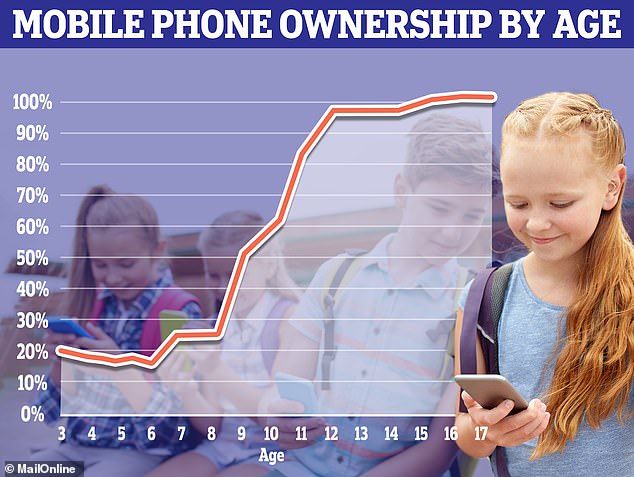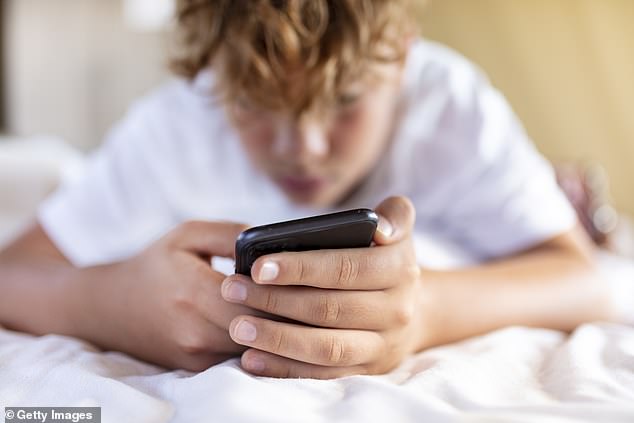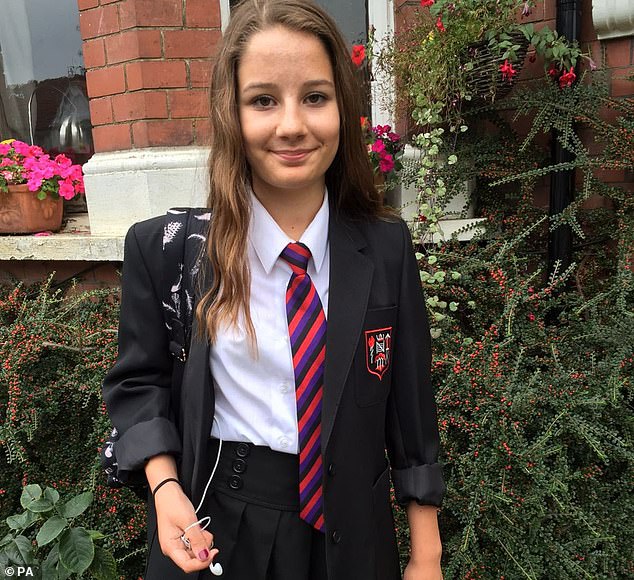The government’s proposed social media curfew won’t make children any safer online, experts have warned.
Ministers are considering implementing an ‘app cap’, to reduce teenagers’ exposure to harmful online content.
However, scientists have told MailOnline that there is no evidence to suggest these restrictions will have any positive effects.
In fact, such restrictions could actually harm children by increasing isolation and facing more social problems during the day, the experts say.
Technology Secretary Peter Kyle suggested children’s social media time could be cut down by law to two hours per day outside of school time and before 10 pm.
Studies have shown that using social media shortly before going to bed can lead to poor sleep patterns, falling academic achievement, and poor mental health.
While that might make a curfew appealing, the scientific evidence suggests that curfews don’t actually help children reduce their screen time or get more sleep.
Professor Peter Etchells, an expert on the effects of digital technology from Bath Spa University, told MailOnline: ‘If we’re worried that social media is harmful, bans don’t fix those problems – they just delay access.’

Technology Secretary Peter Kyle (pictured) indicated he was considering an ‘app cap’ to restrict how much time youths spend on their phones. However, experts say it wouldn’t work
The idea of a social media curfew has been raised as a possible solution to the serious harms that can be caused by excessive social media use.
A study of nearly 10,000 teenagers aged between 13 and 16 found that excessive social media use disrupts positive activities like sleep while increasing exposure to harmful content, especially in the form of cyberbullying.
This can lead to teenagers experiencing increased anxiety, depression, falling grades and even physical health issues.
A recent survey conducted by BSI found that 50 per cent of British young people felt that a social media curfew would improve their lives.
Likewise, there is very strong evidence that taking breaks from social media can have pronounced positive impacts.
Dr Rachel Kent, a leading digital health expert from King’s College London and host of the podcast Digital Health Diagnosed, told MailOnline: ‘There is a wealth of evidence that suggests restrictions and boundaries can be incredibly beneficial.
‘Short periods of time away from our devices can drastically reduce the stress and anxiety that comes from increased screen time.’
Dr Kent says that the curfew would be a ‘good thing’ because it signals to children that they need to have boundaries in their relationship with technology.

Studies have shown that excessive social media impacts sleep, increases rates of poor sleep, and causes academic performance to fall (stock image)

Ofcom data shows that most children receive their first mobile phone between the ages of 10 and 11, with many becoming active on social media around this time. The ban would limit under 18s to two hours of app time per day outside of school hours and before 10 pm
However, as Dr Kent acknowledges, a curfew would be extremely difficult and highly impractical to implement at a national level.
It isn’t clear how the Government intends to enforce any proposed curfew, but it is likely that many ‘digitally native’ children would find a way around any restriction.
In 2011, South Korea implemented the ‘shutdown law’ which prevented under-16s from playing online video games between midnight and 6am.
Years later, research showed that children were only getting 1.5 minutes of extra sleep per night and had simply shifted their online activity to other points in the day, leading to the ban being repealed in 2021.
Professor Etchells says: ‘It’s not clear that it had any positive effect, even though at face value it feels like it should work.
‘I think curfews feel like they are a good solution, but we don’t have good evidence to suggest that they would work in the way that we want them to.’
Recently, a Youth Select Committee report on the effects of social media found that social media bans were ‘neither practical nor effective’.
Experts have also raised concerns that a ban might create inadvertent consequences that cause more harm than good.

Experts told MailOnline there is no evidence that enforced curfews work to reduce screen time or improve sleep (stock image)
Social media expert Rhea Freeman told MailOnline: ‘For everything that’s bad about social media, there are many good things too- finding like-minded people, chatting to friends, connection to family.
‘Restrictions could potentially create divides in friendships and lead to isolation if people’s allocated usage doesn’t line up, I could see this being an issue.’
Likewise, studies conducted among university students found that interventions designed to limit social media use led to negative effects like fear of missing out (FOMO).
However, experts’ biggest concern with the potential curfew is that this restriction doesn’t solve the underlying problem of harmful content on social media
As Professor Etchells points out, bans and curfews only delay access to social media rather than making the internet any safer for children.
The Online Safety Act has passed into law, and from this year will require tech platforms to follow new Ofcom-issued codes of practice to keep users safe online, particularly children.
However, experts say that adding a curfew won’t solve the gaps and weaknesses of this regulation.
Dr Kent says: ‘I would argue that the curfew misses the point. The point is about making sure that the tech companies are taking accountability for the circulation of harmful content, moderating it, censoring it.

Mr Ian Russell (pictured), whose 14-year-old daughter Molly took her own life after viewing harmful content, said that ‘sticking plasters’ would not solve the problem of harmful content online
‘Tech companies need to be held to account and the government needs to be enforcing this.’
Mr Kyle was asked on Sunday morning whether he would look at limiting the time children spend on social media to two hours per app after the Sunday People and Mirror reported the measure was being considered by ministers.
‘I’m trying to think how we can break some of the addictive behaviour and incentivise more of the healthy developmental… and also the good communicative side of online life,’ Mr Kyle told the BBC’s Sunday With Laura Kuenssberg show.
This came after the government was criticised by the father of a teen who took her own life after viewing harmful content.
Mr Ian Russell, whose 14-year-old daughter Molly died in 2017, said that ‘sticking plasters’ would not solve the problem of harmful content online.
Andrew Burrows, CEO of the Molly Rose Foundation, told MailOnline: ‘It’s welcome to hear Peter Kyle look to strengthen online safety protections, but these measures would not change the dial on the harmful content that continues to be bombarded at children.
‘Unless Ministers fix the structural issues that have hamstrung the Online Safety Act, even if it is effective at reducing time spent on platforms, a code of practice on addictive design will be just another sticking plaster.’
What experts would like to see instead is more focus on educating children and carers on how to stay safe online and manage their own social media usage.

The Molly Rose Foundation, founded in memory of 14-year-old Molly Russell (pictured) who died in 2017, says the curfew would be ‘just another sticking plaster’ if it does not solve the underlying problem of harmful content on social media
Children should be taught how to recognise harmful content online and know what to do when they encounter it, the experts argue.
Professor Etchells says: ‘What we need to be talking more about is how we better prepare children and young people for a world saturated with technology.
‘Hard-and-fast bans don’t have much weight of evidence behind them to support them.
But we do know that talking to kids, developing their digital literacy and resiliency skills, developing their communication skills and support networks – these are things which will lead to more sustainable long-term outcomes.’
The Department for Science Innovation and Technology has been contacted for comment.
